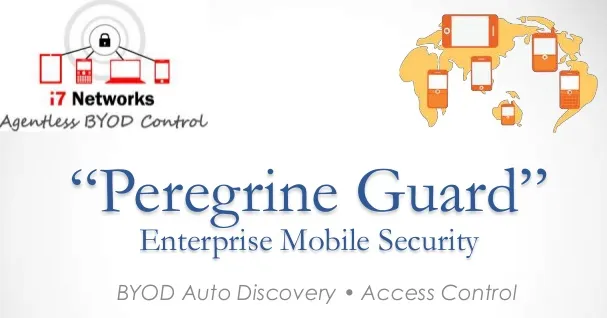PeregrineGuard to provide agent-less BYOD discovery and control product for enterprise mobile security

i7 Networks is a mobile security startup currently incubated at the Microsoft Accelerator for Windows Azure (India). Today, it released the beta version of PeregrineGuard, its latest security offering for enterprises. It monitors BYODs (Bring Your Own Devices) in enterprise LANs and offers a complete security solution through few simple steps executed in seamlessly across wireless networks, without intruding on user privacy.
Manjunath M Gowda, CEO, i7 Networks added that this offering can be deployed and provisioned in a matter of minutes. Being agent-less (we do not put any client on a mobile smart device), it is highly scalable and the issue of intruding into user’s privacy doesn't arise.
The product, which is currently being beta tested with a few niche customers, is offered in two versions—PeregrineGuard Standard and PeregrineGuard Lite. The Lite version does mainly BYOD discovery providing various details about the device type, OS, version and much more including dynamic health check of the device, while the Standard version adds the policy enforcement module on top of it.
PeregrineGuard aims to target US, India and Benelux/Germany area. The target industries include firms that are IP sensitive (high tech, pharmaceutical & healthcare etc) and also those that are security sensitive (Banking, Finance etc.). Their ideal enterprise is that which has enabled BYOD and are probably more than 500+ employees and may be spread across multiple locations. Their ideal customer will also be those BYOD security companies who target enterprises but need a comprehensive discovery & fingerprinting tool. As far as enterprise is concerned they will target via resellers and channel, and actively looking for reseller partners. Here, we talk with Manjunath and try to understand the market and I7's stand.
[Edited excerpts]

YS: How do you compare PeregrineGuard with other mobile security offerings?
MG: Mobile security offerings are broadly classified as MDMs (Mobile Device Management), MAMs (Mobile Application management), Containers, Hypervisors (virtualizations), Dual-persona and also NACs (Network Access Controls).
Almost all of them (except NACs) take an approach where in they put a client on the device and try to control the way the IT is used to control the devices they give (company given devices). All these solutions manage what they know but more than 1/3rd devices are undetected in the network and hence not managed by these tools and these unauthorized devices will be the source of the next data or network compromise. Each such compromise when equated to cost, will run into few million $ and don’t forget the brand erosion, & customer loss for which you cannot put a $ value easily.
This is the white space or the market gap we fill. We discover all the devices especially the unauthorized devices using our patent-pending sophisticated fingerprinting algorithms and either deny access or pull them into the safety net of the organization.
There is another issue w.r.t to the agented way of solving the problem. In BYOD where employee gets his own device, putting an agent gives the feeling of invading into their privacy even when they are not in the office. Agentless solution will be amazing here along with the fact that we don’t have to worry anymore about supporting many different OS, their versions, diff models etc. Even deployment and provisioning the solution in an enterprise becomes easy and scaling is not an issue for us nor even the infamous android fragmentation. All comes easy to us.
YS: How is it different than cloud security offerings by existing players?
MG: Some of the cloud offerings make an employee visit a web site or what is called a registration portal to collect lot of information about the device and sometimes they put a agent which talks to the cloud. Also many a times they relay on third party to provide the information like the Microsoft Exchange ActiveSync etc. Irrespective they put a piece of software in the enterprise to communicate and coordinate.
Moreover cloud software does the management of the devices but not discovery or fingerprinting and again they also have the same issues as the one which are on the premise, they manage what they know and what they don’t know, they have no idea. We can be very complimentary to even the cloud services to provide the discovery and fingerprinting logic/module to complement their offerings.
Another thing I found out is, in large enterprises, cloud play is still seen with skepticism and especially security is still a on-premise play. Nevertheless we compliment both the offerings.
YS: What is the acceptance rate of security technologies among SMBs?
MG: From some of the statistics I have seen, SMB segment is seeing the fastest adoption of BYOD and SMB seems to have a lot of IP and confidential data, patents and inventions and they are ones who are looking out for BYOD security solutions especially in the mature countries. So I expect SMBs to adopt these solutions much faster and with especially no agent to install on the devices, they might like this approach much better.
YS: What challenges do you think you shall have to address before the acceptance of this product becomes smooth?
MG: One of the challenges is to reaching out to resellers and channels that enable BYOD security among enterprises. Another challenge is how to reach out to customers in mature countries with us being here (in India). Technically integration into Microsoft Enterprise ActiveSync (EAS) and also Microsoft Systems Center (SC) is a challenge and we are working on it and making very good progress as I write but to complete fast and to reach out to enterprises who use Microsoft stack will also be a challenge. Overall I feel more challenges in the go to market strategy rather than technology.
We recently interacted with the founders of startup Seclore that helps corporate secure their internal data from being compromised. Here's the interview!
[Editor's note: This article was updated after interacting with Manjunath Gowda, CEO, i7 Networks]
[Image credit]







